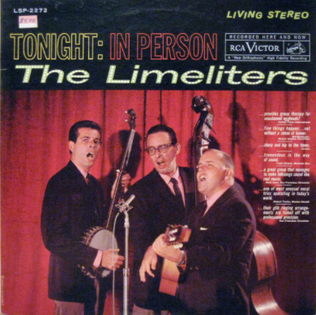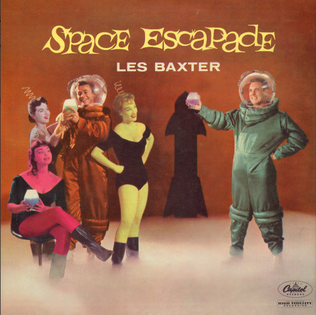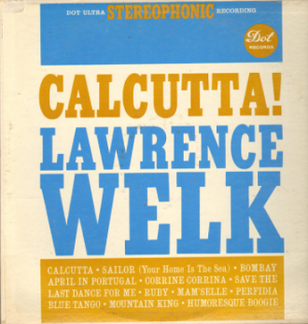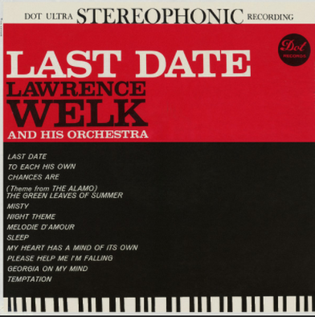Exotica is a musical genre, named after the 1957 Martin Denny album of the same name that was popular during the 1950s to mid-1960s with Americans who came of age during World War II. The term was coined by Simon "Si" Waronker, Liberty Records co-founder and board chairman. The musical colloquialism exotica means tropical ersatz, the non-native, pseudo experience of insular Oceania, Southeast Asia, Hawaii, the Amazon basin, the Andes, the Caribbean and tribal Africa. Denny described the musical style as "a combination of the South Pacific and the Orient...what a lot of people imagined the islands to be like...it's pure fantasy though." While the South Seas forms the core region, exotica reflects the "musical impressions" of every place from standard travel destinations to the mythical "shangri-las" dreamt of by armchair safari-ers.

Without Regret is the first major-label album from American Idol season two seventh place finalist, Kimberly Caldwell. The album was released on April 19, 2011.

More Gunfighter Ballads and Trail Songs is a studio album by country music singer Marty Robbins. It was released in 1960 by Columbia Records as a sequel to Robbins's 1959 hit album Gunfighter Ballads and Trail Songs.

Forbidden Island was the third album by Martin Denny. The album was produced in March 1958 at the Liberty Studios in Hollywood, following the group's nine-month gig performing at Don the Beachcomber's Bora Bora Lounge in Hawaii. Forbidden Island was Denny's first album to be recorded and released after vibraphonist Arthur Lyman left the group to pursue his own solo career. The album includes four original compositions by Denny: "Cobra", "Exotica", "Primitiva", and "Forbidden Island".

Right or Wrong is a studio album by country music and rockabilly singer Wanda Jackson. It was released in October 1961 by Capitol Records. The album cover says that Jackson "pours sugar over six ballads and rocks around six big beat tunes." The album included Jackson's hit song "Right or Wrong", which peaked at No. 9 on the country chart and No. 29 on the pop chart.

One More Time is a compilation album by Kay Starr. It was released in 1960 by Capitol Records.

Tonight: In Person is a live album by the American folk music group, The Limeliters, a trio made up of Lou Gottlieb, Alex Hassilev, and Glenn Yarbrough. It was recorded live on July 29, 1960, in Hollywood, California, at the Ash Grove, a former Melrose Avenue furniture factory converted into a folk music club. The album was released in January 1961 on the RCA Victor label. It was the group's first album for RCA Victor.

$1,000,000 Worth of Twang is a compilation album by guitarist Duane Eddy.

Mantovani Plays Music from Exodus and Other Great Themes is an album by Mantovani and His Orchestra. It was released in 1960 by London. It debuted on Billboard magazine's pop album chart on December 5, 1960, held the No. 2 spot for five weeks, and remained on the chart for 44 weeks. It was an RIAA certified gold album. AllMusic later gave the album a rating of four-and-a-half stars.

Songs to Remember is an album by Mantovani and His Orchestra. It was released in 1960 by London.

It Must Be Him is an album by Ray Conniff and The Singers. It was released in 1967 on the Columbia label.

Say It with Music (A Touch of Latin) is an album by Ray Conniff, His Orchestra and Chorus. It was released in 1960 on the Columbia label (catalog no. CL-1490).

Tamboo! is an album by Les Baxter, His Chorus and Orchestra. It was released in 1955 on the Capitol label.

Les Baxter's La Femme is an album by French conductor Franck Pourcel and His French Strings. It was released in 1956 on the Capitol label. Upon its release, Billboard magazine gave the album a rating of 77 and wrote: "'La Femme' might be called a 'pop' symphony, in a dozen movements, dedicated to woman -- her eyes, lips, arms, hands, etc. The pieces are reflective of the mysteries of femininity, and the whole attractive opus is the work of Les Baxter."

Caribbean Moonlight is an album by Les Baxter. It was released in 1956 on Capitol Records. In January 1957, it reached the No. 5 spot on Billboard magazine's "Pop Instrumentals" chart.

Space Escapade is an album by Les Baxter and His Orchestra. It was released in 1958 on the Capitol label. Baxter also composed the music.

Les Baxter's African Jazz is an album by Les Baxter and His Orchestra. It was released in 1959 on Capitol Records The album consists of original music composed by Baxter. Upon its release, the album received a four-star rating from Billboard magazine. Billboard called it an "imaginative package" with "inventive treatments", excellent sound, and "lush, rich approaches."

'Round the World with Les Baxter is an album by Les Baxter, His Orchestra and Chorus. It was released in 1957 on Capitol Records. The album was recorded on August 8, 1956.

Calcutta! is an album by Lawrence Welk and His Orchestra. It was released in 1961 on the Dot label. The album featured Frank Scott at the harpsichord and included Welk's No. 1 hit single, "Calcutta".

Last Date is an album by Lawrence Welk and His Orchestra. It was released in 1960 on the Dot label.



















